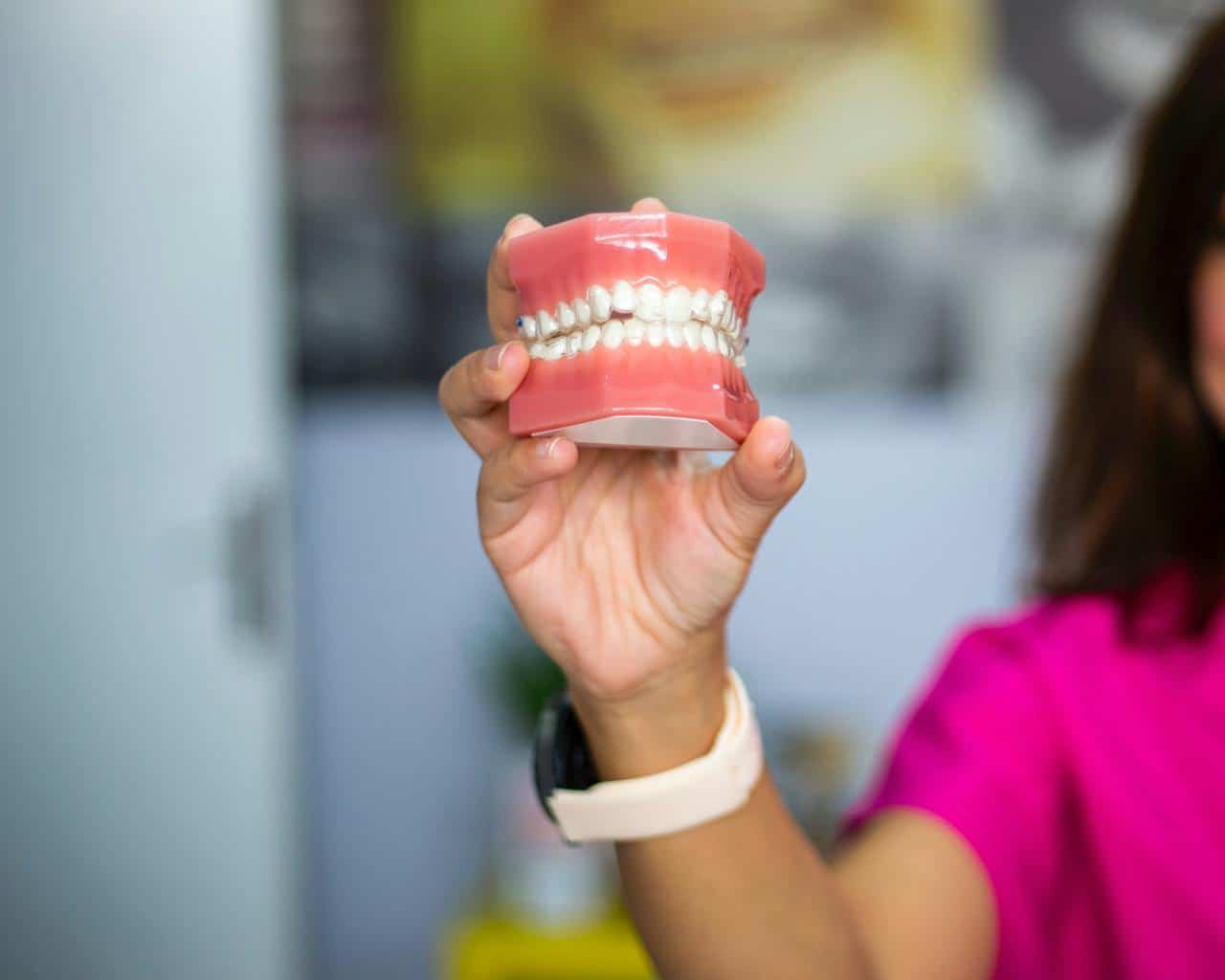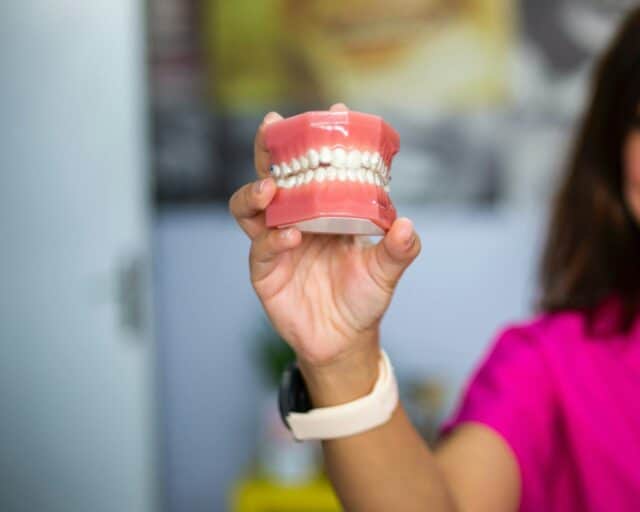
Dental implants with bridges are an advanced and effective solution for replacing multiple missing teeth. This procedure combines the stability of dental implants with the restorative function of bridges, providing a durable, natural-looking alternative to traditional treatment methods.
Below, you’ll discover the different types of implant-supported bridges and their unique benefits. You will also learn how they can transform your smile and oral health and the different factors to consider if you opt for this procedure.
What Are Dental Implants With Bridge?
Dental specialists use a dental implant with a bridge to replace missing teeth by anchoring a dental bridge to titanium implants embedded in the jawbone. Unlike traditional bridges, which rely on adjacent teeth for support, implant-supported bridges are self-sustaining options, proving to be a better long-term solution for many patients.
In this procedure, the titanium implants act as artificial roots. They provide stability and help stimulate bone growth. At the same time, the process provides much-needed support for the bridge, replacing the tooth roots and visible crowns.
This solution offers superior stability, durability, and aesthetics compared to other restorative options. Dental implants with bridges help restore your smile and oral health by mimicking the function and appearance of natural teeth.
Types of Implant-Supported Bridges
Choosing the right type of implant-supported bridge depends on your dental needs, bone health, and personal preferences. Here’s an overview of the primary types:
Fixed Implant-Supported Bridges
Fixed bridges are permanently secured to implants and are not removable by the patient. This option is ideal for replacing multiple adjacent teeth and offers a natural feel and appearance. These bridges are crafted from durable materials like porcelain or zirconia, ensuring longevity.
Removable Implant-Supported Bridges (Overdentures)
Overdentures snap onto attachments on dental implants and can be removed for cleaning and maintenance. They are best suited for patients who are already missing all teeth in an arch. Removal implant-supported bridges help provide greater stability compared to traditional dentures.
All-on-4 and All-on-6 Bridges
This method uses four or six implants to support a full arch of teeth. The implants are strategically placed to maximize existing bone, making this a cost-effective and efficient solution for total arch restoration.
All-on-4 and All-on-6 bridges differ in the number of implants used to support a full arch of teeth. All-on-4 bridges utilize four strategically placed implants, while an All-on-6 variant employs six for added stability and support. An all-on-6 bridge is often recommended for patients with sufficient bone density, providing enhanced durability and load distribution.
Hybrid Options
Hybrid bridges combine elements of both fixed and removable bridges, offering flexibility in specific cases. These may be recommended for patients with unique needs.
Steps Involved in Getting Implant-Supported Bridges
Getting dental implants with bridges involves multiple stages to ensure optimal results. Here’s what you can expect:
- Initial Consultation: Your dentist will assess your oral health, take X-rays, and discuss your goals.
- Preparatory Procedures: If necessary, treatments like extractions or bone grafting are performed to prepare the jaw for implants.
- Implant Placement: Titanium implants are surgically placed into the jawbone, integrating with the bone over several months.
- Healing Period: The jawbone and implants fuse during a process called osseointegration.
- Bridge Placement: A custom-made bridge is attached to the implants once healing is complete.
This step-by-step process ensures that your implants are secure and your bridge fits perfectly to restore function and aesthetics.
The Benefits of Dental Implants With Bridges
Dental implants with bridges offer numerous advantages beyond traditional tooth replacement options. Here are some key benefits you can expect from this procedure:
- Restoration of Natural Functionality: Chewing and speaking abilities are restored to approximately 90% of the function of natural teeth.
- Replacement of Both Teeth and Roots: Implants replace the entire tooth structure, including the roots, for added stability.
- Simplified Maintenance: Fixed implant-supported bridges can be cleaned like natural teeth, making daily care straightforward.
- Enhanced Aesthetics: These bridges blend seamlessly with natural teeth for a beautiful smile.
- Bone Preservation: Dental implants stimulate the jawbone, preventing bone loss and preserving facial structure.
- Durability: With proper care, implants and bridges can last decades.
- Minimal Impact on Adjacent Teeth: Implants don’t rely on neighboring teeth for support, protecting their integrity.
- Improved Comfort: The secure fit eliminates the discomfort often associated with dentures.
Who Can Benefit From Dental Implants With Bridges?
Dental implants with bridges are an excellent choice for patients with multiple missing teeth who want a long-term solution. They’re particularly beneficial for:
- Individuals with good oral and general health, including sufficient jawbone density.
- Patients seeking a fixed, natural-looking alternative to dentures.
- Those looking to avoid the downsides of traditional bridges, such as compromising healthy teeth.
- People who value the convenience and durability of a permanent solution.
However, your dentist may need to evaluate additional considerations if you have certain medical conditions or are a smoker.
Cost Considerations
While implant-supported bridges have a higher upfront cost than other implants, bridges or dentures, they provide excellent value over time due to their longevity. Costs include implant placement, bridge fabrication, and preparatory procedures like bone grafting.
Many dental practices offer financing options to help patients afford this life-changing procedure. Be sure to discuss your insurance coverage and payment options during your consultation.
Maintenance and Care
Caring for dental implants with bridges is straightforward and essential for long-term success. Here are some care tips that can help prolong the usable life of your implants:
- Brush and floss daily, focusing on the areas around the implants.
- Use special tools, like interdental brushes, to clean hard-to-reach areas.
- Schedule regular dental check-ups for professional cleanings and assessments.
- Avoid habits like chewing hard objects that could damage the bridge.
By following these guidelines, you can maintain the health and functionality of your implants for years to come.
Restore Your Smile and Confidence with Implant-Supported Bridges
Dental implants with bridges offer a reliable, aesthetically pleasing solution for patients with multiple missing teeth. Whether you’re looking for fixed or removable options, this treatment provides long-lasting results that improve oral health and quality of life.
At Archpoint Implant Dentistry, we specialize in advanced dental implant procedures, including implant-supported bridges. Our team is dedicated to helping you achieve a confident, healthy smile with personalized care.
Book an appointment with Archpoint today and take the first step toward restoring your smile!








